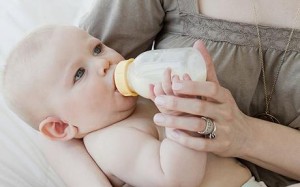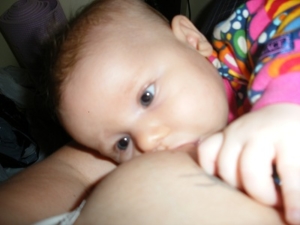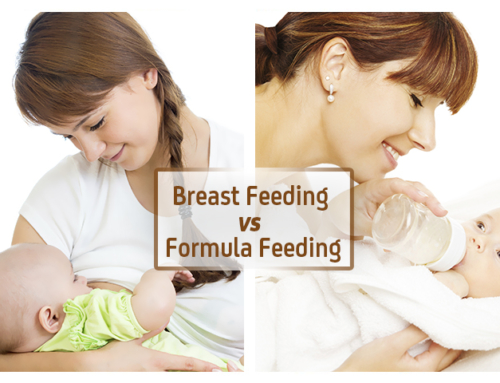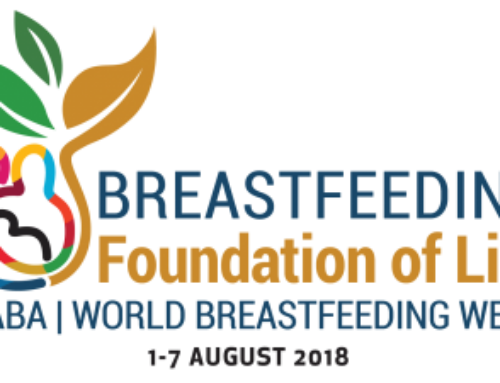If you’ve looked at almost any news source recently, you’ve probably seen the headlines proclaiming that formula actually helps moms breastfeed. And if you’re like me or many others, you probably said, “What the…?” and started looking for more. I’m not going to talk about what the media outlets report, but rather what the actual research suggests, as that’s what we ought to be dealing with.
In a nutshell, researchers took 40 infant-mother dyads where the infant was at-risk of not being breastfed (but all of whom wanted to exclusively breastfeed) and provided small, measured amounts of formula to half of these infants until mom’s mature milk came in (the experimental group) or nothing except continued breastfeeding (the control group). The researchers then followed up looking at breastfeeding or formula use at 1 week, 1 month, 2 months, and 3 months. They found significant differences between the two groups in the amount of breastfeeding at all and exclusive breastfeeding at the 3-month (and earlier) follow-ups. Notably, 95% of moms in the experimental group versus 68% of moms in the control group were breastfeeding at 3 months (80% vs. 47% were exclusively breastfeeding).
What are the issues?
The first thing that many articles are not discussing is that this study, as mentioned, was for infant at-risk of not being successfully breastfed, despite maternal intentions to breastfeed. This was established using the criteria of only including babies who had lost more than 5% (but less than 10%) of their weight in under 36 hours. There is research, as cited by these authors, that early, significant weight loss is associated with maternal anxiety about feeding and also one of the more commonly cited reasons women say they give up breastfeeding prior to 3 months. The entire point of the study was to alleviate maternal anxiety about supply. We’ll get back to this in a minute, because this is the crux of the issue to me, but I also wanted to bring up another key point that isn’t getting a lot of press in the popular media.
As many of you know, most research contradicts this, with early formula use linked to lower breastfeeding success, a topic the researchers are very clear to talk about because they actually do not believe that formula as it has been given out to women in the past is helpful. The differences between previous studies and practice and this particular intervention is threefold. First, the current intervention offered very small amounts of formula – 10mL only – after a breastfeed to ensure that the infants were not satiated by the formula and continued to want to breastfeed. Second, they only administered formula by syringe – no bottles – so that infants would not get nipple confusion. And finally, prior to beginning there was a clear time frame for this limited formula use; namely, mothers knew it would stop as soon as their mature milk came in. So in many ways, what this intervention provided was not the typical bottles of formula given to moms, but rather a very calculated way to alleviate mom’s worry while providing the minimal amount of formula to the infant.
Getting back to the issue of anxiety – this is the key problem for me. While I understand that the researchers are actually trying to help breastfeeding rates, it still is no good for baby given that it impairs the virgin gut which is key to developing many of the health benefits associated with breastfeeding. (For a great review article on the virgin gut, check out The Alpha Parent’s piece here, and check out the science behind it all at Dr. Jay Gordon’s summary here.) Even more than this, though, is that it’s addressing a problem by feeding into it. By offering supplementation, parents’ anxieties are being confirmed – they aren’t making enough milk at first, their baby is hungry, etc.
Instead of this type of intervention, would it not be better to work on information interventions? For example, we know that the use of an epidural is associated with greater weight loss in the first 48 hours (most likely due to artificial weight gain via excess fluids)[2], so providing mothers with a chart of what’s normal in terms of weight loss given their situation would be much more beneficial. These “at-risk” infants lost an average of 6% of their weight, yet average weight loss for normal, term, breastfed infants is in the realm of 5.5%[2]. Only formula-fed babies show a very small weight loss on average (around 2.5%)[2]. So of course if we’re comparing infants to this non-biological ideal, women will be anxious. Despite their babies being biologically normal.
Imagine if they actually increased the sample and simply measured weight loss and weight gain all while looking at the factors we know to influence this (i.e., birth weight, epidurals, etc.). Then you measure them for a few weeks after to get a baseline later. You offer support to the mothers during this time so they know they can continue breastfeeding (after all, these are women who want to breastfeed). At the end of this, you have real data of the variability in weight loss but also hopefully good health status of all infants at the end of the couple week period. This would give parents (not just mothers) the information they could use to feel comfortable that what they experience with weight loss is okay. That they will get the breastfeeding thing down with support and not have to turn to formula early and often.
So will formula help you breastfeed? In the measured way they administered it, possibly, if you’re at-risk of not breastfeeding due to higher than expected weight loss and anxiety associated with that. But all this effect has done is alleviate mom’s anxiety. There are better ways to do this that don’t involve formula, so why are we not looking at those (namely, just giving moms support and information)? Especially when we know most people will not know exactly what was done here and will assume formula in a bottle to supplement might help when we know that’s not the case.
[1] Flaherman VJ, Aby J, Burgos AE, Lee KA, Cabana MD, Newman TB. Effect of early limited formula on duration and exclusivity of breastfeeding in at-risk infants: an RCT. Pediatrics 2013; DOI: 10.1542/peds.2012-2809.
[2] Martens PJ, Romphf L. Factors associated with newborn in-hospital weight loss: comparisons by feeding method, demographics, and birthing procedures. J Hum Lact 2007; 23: 233-41.








I find it very interesting that babies who had lost between 5 and 10% were considered at-risk. My son had lost about 8% upon discharge, approximately 60 hours after birth, and my caregivers (midwives) never implied it was out of the ordinary. In fact, they said that he might lose even more weight before gaining. Armed with this, my partner and I were prepared when the grandparents started to push the idea of supplementation. Knowledge intervention was definitely helpful for us, especially in the face of unceasing grandparental anxiety.
Why don’t they just use the mother’s milk as a supplement (delivered via syringe) rather than formula?
An excellent question, though I imagine it’s a supply issue due to them not requesting milk, etc.
I think one of the problems with starting and maintaining breastfeeding is that in general midwives have poor knowledge and training with regards to breastfeeding and even some of the lactation consultants aren’t much better. (or perhaps the good info on breastfeeding is so buried it’s not getting through??) As a result women who are having difficulties (or are even just anxious about something which is normal) are given conflicting or even incorrect information. I have seen this both professionally and personally and it is frustrating how many women give up breastfeeding or pump for months when a bit of good information and assistance early on would have sorted the issue out
The same was done for my son. Formula fed via a tube/with syringe. He was a premmie, with feeding issues & I had no to very limited milk. Took almost 2 wks of pumping milk 24/7 to bring in my milk supply fully. But my EBM was always given to bub before formula, formula was only used initially, & then just for topping up. Which became less & less as my milk got greater.
I find it strange that these infants were considered at risk at losing only 6% of their birth weight. I live in Australia but in the hospital my husband and i were told that anything up to 10% was perfectly normal so we didn’t worry when my son had lost about 8-9% on discharge. We ended up getting a good breastfeeding relationship happening as i didn’t feel pressured to produce milk, as it were. My son made up for lost weight by gaining 600 gms within 12 days of birth. I wonder how much different the outcomes would have been if these poor mums weren’t told their infants were at risk. It just doesn’t seem fair to the mums or the babies
I 100% agree. These children were *not* at-risk (well, based on averages, at least some of them) so I don’t know why parents were made to worry!!!
My baby lost 8% of her birth weight on day 3, the midwife said that this was enough to make them want to re-weigh her in three days, but that there was no need to do anything other than keep feeding her unless her weight loss was more than 10%. She gained 100 g in the 2 days after my milk came in then another 500g in the next five days (all we did was feed – it was a bit of a marathon). Overall she gained 400g on her birth weight by day 10. However, I would say she wasn’t quite right on the day before my mature milk came in – she was extremely sleepy and I woke to feed her every few hours in the day and every four at night, on that last day it was rare that she was waking herself to feed. After 12 hours of sugary mature milk she was a completely different baby – wriggling and loudly requesting milk if I wasn’t quick enough to strip my clothes off.
For me, the most challenging time was the next few days – she was cluster feeding and coming off the breast hungry. Even though I know this behaviour is required to increase supply I found it incredibly hard, even as she gained weight quickly (and obviously) that was the part of feeding that made me anxious.